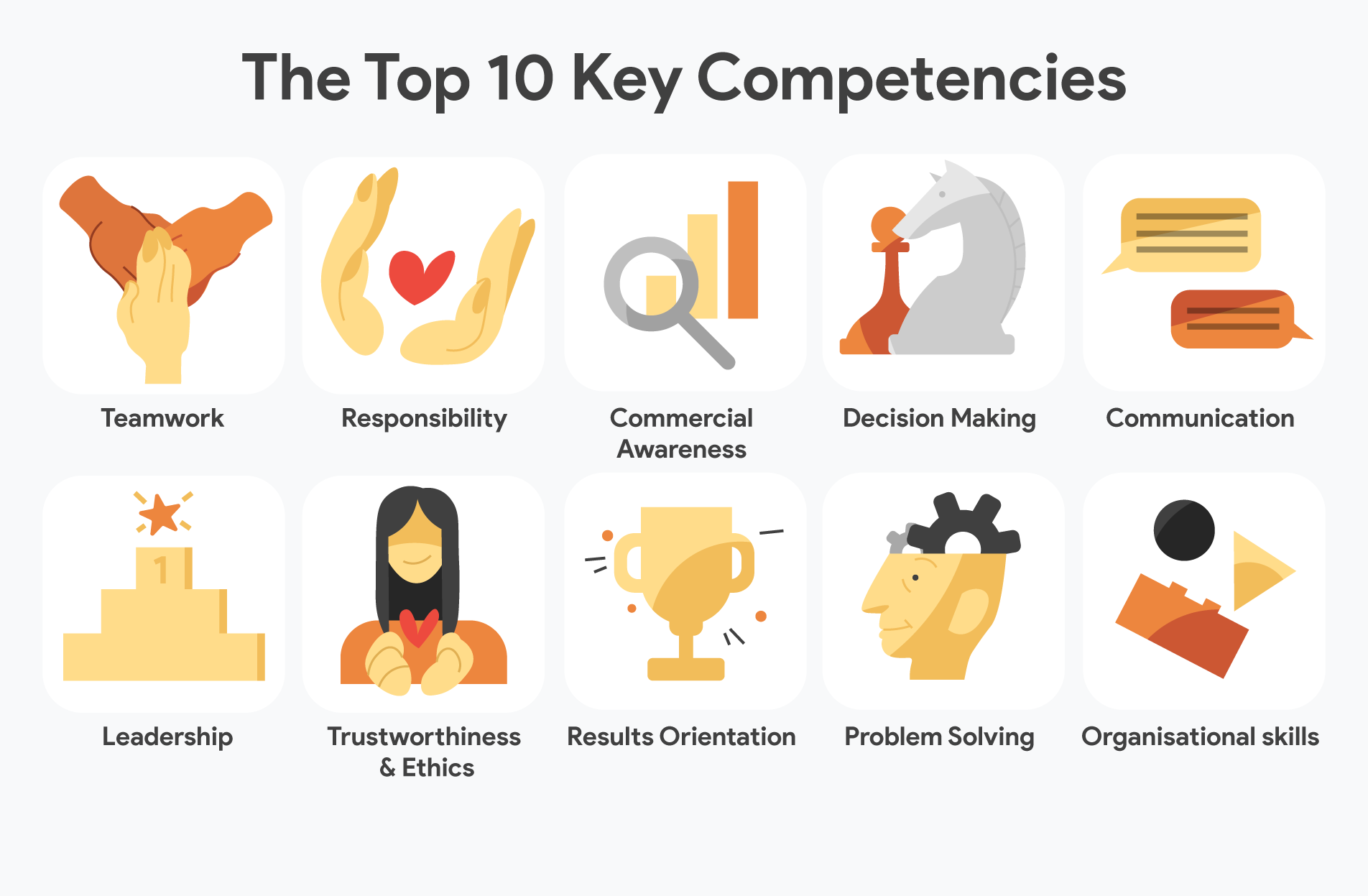A List of 12 Key Competencies Employers Look For in 2025
All products and services featured are independently selected by WikiJob. When you register or purchase through links on this page, we may earn a commission.
- What Are Competencies?
- Top 12 Key Competencies List and How to Develop Them
empty
empty
empty
empty
empty
empty
empty
empty
empty
empty
empty
empty
- Frequently Asked Questions
- Final Thoughts
What Are Competencies?
Key competencies (also known as core competencies or skills) are specific qualities that a company's recruiters consider desirable for employees to possess in order for them to be successful in a certain role or for future success.
Key competencies are often used as benchmarks to rate and evaluate candidates during the recruitment process, especially when reviewing cover letters, application forms and at interview.
During the recruitment process, you will likely be asked competency-based questions, and the recruiter will use your answers to determine your suitability.
You should therefore identify the key competencies of any given role at the beginning of the application process, and match your skills and experience to them.
Often, you will be given ‘essential criteria’ that will outline the specific competencies the company has identified as key. These might be in addition to hard skills or soft skills that the company lists as essential or desirable.

Here is a list of the top 12 examples of key competencies examples that employers use when recruiting candidates:
Top 12 Key Competencies List and How to Develop Them
1. Teamwork
Vital competency for the majority of careers, because teams that work well together are more harmonious and more efficient.
Even if you work alone or remotely, it is still important that you are able to communicate ideas and see the bigger picture of how your work will be used by others in the organisation.
Being able to work well in a team shows that you value others, can show empathy and have the maturity to realise that no work is standalone.
Employers will be assessing whether you are able to work with others towards a common goal and graciously share credit.
Working in a team requires excellent communication skills and problem-solving abilities, which you will need to demonstrate in any examples you give. See below for further details on both those traits.
How to improve your teamwork competency:
-
Volunteer for team roles – Projects and tasks within the workplace which require a team of individuals are a good place to learn the skills that you will need.
-
Join a sports team or other organisation – Not only are sports good for your health, but they are also a good way to learn how to work with others to achieve a common goal. If you are not someone who particularly enjoys sports or are unable to participate for another reason, joining a local community organisation can have the same results.
2. Responsibility
The ability to take on a certain level of responsibility skills is necessary for most jobs. Candidates that are good at taking responsibility are comfortable making decisions or taking ownership of their work.
At senior levels, the responsibility that an employee is expected to bear will be greater, but even in entry-level roles, the recruiter will want to see examples of how you have handled responsibilities in the past.
This will give them a good indication of how you work under stress, how you resolve issues and your work ethic in general.
How to improve your responsibility skills:
-
Ask or volunteer for roles that require more responsibility – One of the best ways to learn is through practice. If there is a project or a role available which needs someone to lead, volunteer for it.
-
Practice punctuality – Often, those who are considered to be responsible are punctual with their time keeping. By arriving at the time you say you will or completing tasks within set deadlines, you will be showing that you can be responsible in other ways.
3. Commercial Awareness
Commercial Awareness is one of the important key competencies. An employer wants to know that you understand how their business works. Only then can you really understand your role within it.
Most simply put, it is about staying up-to-date with your industry and business in general. This includes marketing trends, customer demographics, technical advances, and the successes and failures of competitors.
To improve your commercial awareness, keep abreast of the latest industry news and fully research your chosen company and its competitors.
Get as much work experience as you can, so you can demonstrate to an employer that you understand the role.
How to improve your commercial awareness skills:
-
Research the company you work for – Find out what it is that they do and how they do it, and make sure that you have a greater understanding of the business you are in.
-
Keep up-to-date with industry trends – Making sure to stay on top of news and changes within your industry can help you to understand what is going on within the economy as a whole and can help to determine actions that need to be taken.
-
Be aware of your closest competitors – What are other, similar companies doing better than the company you work for, what are they doing worse and how can you compete with them? All of these questions will help to make sure that you are aware of what needs to be done to remain ahead of the competition.
4. Decision Making
An employer will want to see that you can make the best possible decisions in the shortest amount of time, by gathering information, seeking opinions, analysing all possibilities and coming up with an effective solution.
Decisions can often be very complex and the possible outcomes very serious, so recruiters will examine whether you can explain the reasons behind your decisions.
How to improve your decision making skills:
-
Ask for more responsibility – When you are in a situation of responsibility you are more likely to need to make decisions.
-
Practice being assertive – One of the most important things when it comes to making a decision is having the ability to share the decision that you have made and see it through to completion. To do this, you will need to be able to stand up for what you have decided in an assertive, yet respectful, way.
-
Ask a mentor – If you aren’t used to making decisions then it can be a good idea to find someone who has been in your position before and can offer advice. Having a mentor can help you to feel more confident in your decision making skills if you know that it’s the same choice someone else would have made.
To find out which jobs fit your personality best, visit our partner CareerFitter and take the Career Test for FREE.

5. Communication
Excellent communication skills are essential in any role. What employers really want to know is that you can convey information to other team members in a way that is confident, professional and easy for others to understand, whatever their level.
You should be clear and concise when sharing information with colleagues to avoid misunderstandings.
This might involve communicating information to colleagues, dealing with customers or negotiating successful contracts.
Generally, employers are looking for good written communication and verbal communication skills. Sometimes they will scrutinise your presentation and listening skills too.
WikiJob also produces a psychometric tests app, available for both Apple and Android, which includes 8 verbal tests, with a timer and worked solutions.
How to improve your communication skills:
-
Write things down – If you are someone who tends to forget what they need to say just as they pick up the phone or join a meeting, try writing down your key points first. This can help you to stay on track and help you to remember everything.
-
Practice listening – One of the most important things that any communicator can do is be a good listener. This will help you to understand how to properly respond. People who feel as though they are listened to are also more likely to respond well to what is being asked of them.
-
Learn body language – Understanding the basics of body language can help when deciding how to handle a situation and the best way to approach different staff members.

6. Leadership
Leadership competencies are especially important if you are looking to progress into a management position. Even if not, employers still want to see that you are the type of person who can progress in their company and motivate others.
Leadership competency will involve skills like delegating and setting deadlines, but it is also about your leadership style and interpersonal skills.
You will be assessed on how you communicate with others, including human resources and other important business departments, how you build relationships and how you handle conflict.
How to improve your leadership skills:
-
Volunteer for tasks – Whether it is organising a team lunch, fundraising event or teambuilding exercise, volunteering to organise events will help you to build on your teambuilding skills as you will need to work with others to arrange everything properly.
-
Listen – A good leader needs to listen to their team. If employees don’t feel as though they are being listened to, there are likely to be issues with morale and productivity which can affect how well projects and tasks are completed.
7. Trustworthiness & Ethics
A person who is trustworthy and aligned with the ethics of the business will build better relationships with existing staff members and enhance teamworking efforts.
They will also be able to build real relationships with customers, who will trust that they have their best interests at heart.
Demonstrate your trustworthiness competency by being honest and open in your application, and show good moral judgement if asked about difficult workplace scenarios.
How to improve your trustworthiness & ethics skills:
-
Look for opportunities to prove yourself – Being trustworthy is a skill that tends to be proven rather than learned. Look for opportunities where you can show that you are someone who can be trusted.
-
Be consistent – Someone who has a strong sense of ethics and is trustworthy is consistent in this. Make sure that you are always portraying yourself the way that you want to be thought of.
8. Results Orientation
If a person is results-oriented they are focused on their goals and understand the steps needed to achieve them. They will also have the motivation to see projects through to fruition and motivate others to do the same.
Being results oriented is also about knowing how to set goals with steps that are realistic and achievable whilst also being ambitious enough to increase levels of motivation.
Demonstrate this competency by thinking of real-life examples of when you stuck to a task despite overcoming problems, met a deadline or managed budgets.
How to improve your results orientation skills:
-
Turn big goals into smaller ones – By breaking large tasks into smaller, more achievable targets, you will often find that you can be more motivated to complete them.
-
Keep an eye on your progress – Knowing how far you have come can have a significant impact on your motivation. This is especially true if it feels that things are moving slowly or progress isn’t being made.
-
Have a partner or mentor – Knowing that there is someone to whom you are accountable can help to ensure that you are hitting the targets that need to be attained and achieving progress. After all, nobody wants to admit that they haven’t done the things that they need to.
9. Problem Solving
It’s important to demonstrate that, when a problem arises, you are able to stay calm under pressure, research possible causes, identify trends and choose the most relevant solution.
You are going to encounter problems at work, and employers want to see how you will deal with this. The more senior you are, the more problems you will likely have to resolve.
For some roles, problem-solving is a key aspect, such as analysts, law professionals and customer-service-based roles.
How to improve your problem solving skills:
-
Puzzle books – Puzzle books and apps are a good way to train your brain to consider all of the possible solutions to a problem. These skills can then be applied to issues that may be found within your working life.
-
Brainstorming – If you are struggling to consider all of the possible solutions to a problem, it can help to have brainstorming sessions where you put everything that you can think of down onto a piece of paper or board. This is a visual process that can help you to see patterns, trends or areas which need to be improved, therefore allowing you to see all of the possible solutions.
10. Organisational Skills
In any business, being organised is highly prized. An employer will be looking at how you achieve results by prioritising workload, effective time management, showing efficiency with resources available and monitoring progress.
For higher-level roles that involve managment of people or projects, you might also have to demonstrate that you are good at project management, strategic planning, resource management, delegation and managing large projects.
How to improve your organisational skills:
-
Write lists – One of the easiest ways to organise yourself is to write lists of everything that you need to do and the order each thing needs to be done. This helps to get you into the habit of prioritising and understanding how to organise different tasks.
-
Understand the importance of balance – It is much easier to organise yourself for work-related tasks if you have a good work-life balance. Too much time working, with very little downtime, can lead to issues with motivation which can then impact how well you can organise yourself and those around you.
11. Adaptability
When it comes to key competencies, few are as useful and important within the workplace as adaptability.
Being able to adapt to changing situations, requirements or briefs can enable you to accomplish a task with the minimum amount of stress. It can also mean that you can work around issues that may occur throughout a project or in your wider career.
Employers will look for individuals who are adaptable to ensure that the workplace can run smoothly no matter what happens. After all, it doesn’t matter how well contingencies are planned for and projects are managed, there is always the potential for the unexpected. Having employees who can adapt to unexpected circumstances can mean that those in more senior management roles can get on with the things that they need to do rather than worrying about the teams below them.
How to improve your adaptability skills:
-
Put yourself in situations where you don’t necessarily know what to expect – This will help you remain calm and train your brain to think of solutions quickly.
-
Puzzles and escape rooms – When you visit an escape room, you are given a task but you need to find a solution for a variety of unexpected problems. These skills can then be adapted for use within the workplace.
-
Mindfulness – If unexpected challenges make you feel nervous or anxious, it can help to practise mindfulness techniques. These will help you to remain calm and think clearly.
12. Analytical Thinking
Analytical thinking is a term used to describe a set of skills that uses factual information to derive conclusions. This information can then be used to guide decisions and processes.
Employees must be able to use analytical thinking within their roles. This will enable them to be able to use the information that they are given to decide the best course of action to take.
Having good analytical thinking skills will also mean that they can see all of the possible solutions before making a decision. This reduces the reliance of employees on more senior-level individuals when it comes to problem solving and day-to-day processes.
How to improve your analytical thinking skills:
-
Read – It is important to never underestimate the importance of reading in many areas of life. When it comes to analytical thinking, making sure that you are reading a wide variety of books and texts can help you to develop and strengthen your skills.
-
Brian games – Whether you use puzzle books, apps or another method is entirely down to personal preference, but brain games can help you to develop stronger analytical thinking skills without really realising that’s what you’re doing.
Frequently Asked Questions
When it comes to key competencies, there are far more than five which can be considered and the exact ones which an employer would be looking for can vary depending on the company and the role they are looking to fill.
Generally, though, key competencies can be split into five areas:
- Self-awareness
- Decision making
- Self-management
- Relationship skills
- Social awareness
The exact competencies that a potential employer will be looking for will vary depending on the role they are looking to fill. It would be easy to say that you should work on all of the competencies, but this is a difficult thing to do in one go.
If you are looking for particular areas to focus on and improve, it is a good idea to make sure that you have strong communication skills, decision making skills and adaptability skills. Being strong in these particular skills will help you to strengthen other areas.
There are more than seven core competencies and it is impossible to truly know what each employer will be looking for.
However, seven of the most commonly desired core competencies are:
- Problem-solving skills
- Team Working skills
- Organisational skills
- Adaptability skills
- Decision-making skills
- Leadership skills
- Analytical thinking skills
The term ‘key competencies’ is used to describe a set of skills that employers look for in potential candidates when they are recruiting staff. They are skills that are deemed to be desirable for their ideal new employee in relation to the job they are hiring for and the values of the company as a whole.
Because of this, the key competencies which a company will consider to be essential will vary depending on the business which is hiring and the role candidates are applying for.
They are essentially the same thing. Some people could argue that a soft skill is something that can be learned whereas a competency is a personality trait, but this is a very blurred line. While it is possible to say that some people are naturally organised or naturally good leaders, it is also possible to develop these skills for use within the workplace.
Here are some key competencies commonly included in CVs:
- Technical skills
- Soft skills
- Analytical skills
- Customer service
- Project management
- Sales and marketing
- Language skills
- Leadership
- Problem-solvng
- Attention to detail
- Creativity
- Financial skills
- Multitasking
- Negotiation
- Networking
- Technical writing
- Research skills
Final Thoughts
Competencies are important benchmarks for assessing a candidate's suitability for a role.
Competency-based questions, whether in an interview or on an application form, will focus on the key traits outlined in the job description.
It’s important to make sure you have identified these, and can evidence them with relevant examples from your prior work, education, or hobbies and travel.




